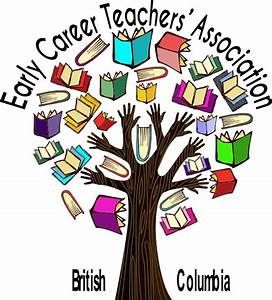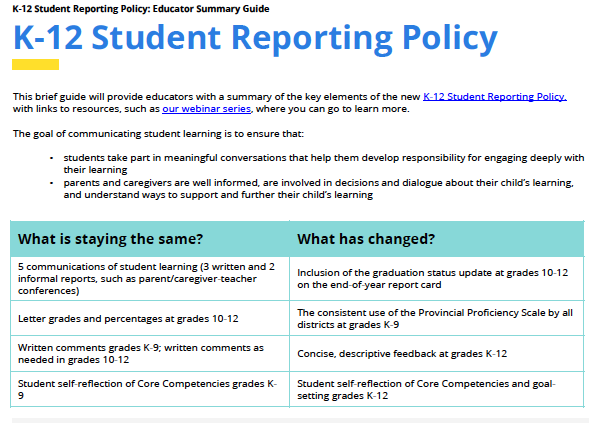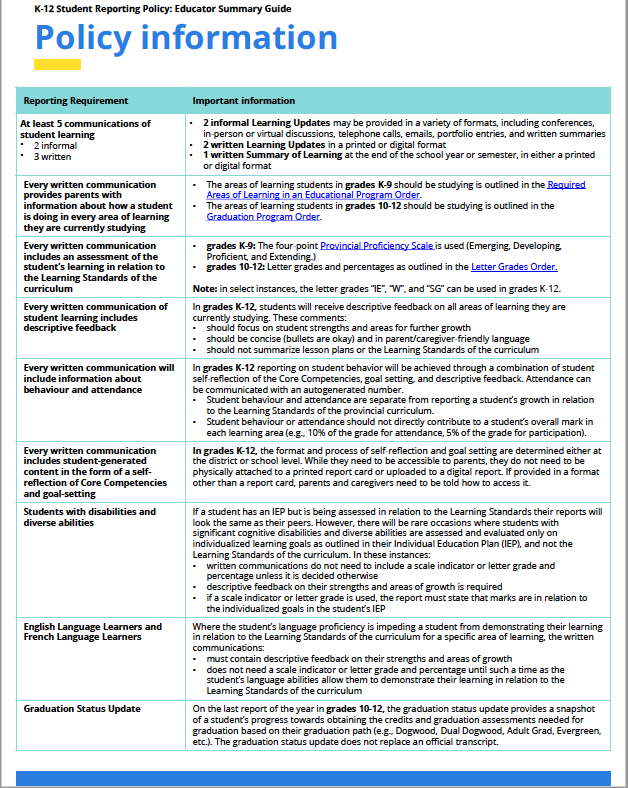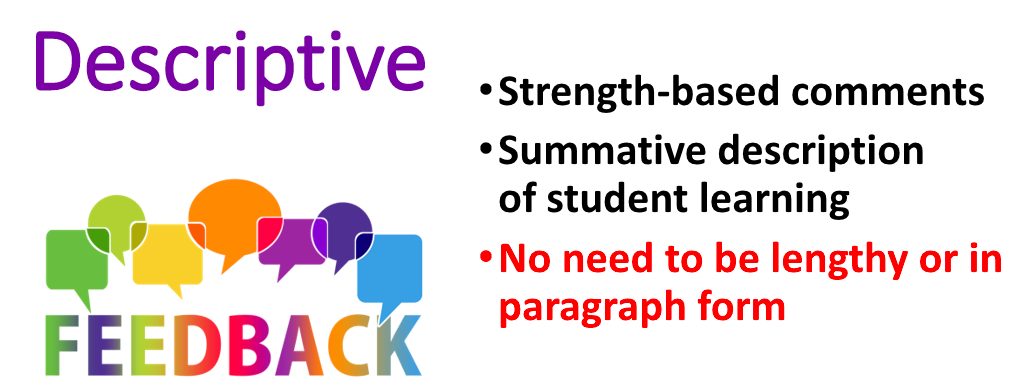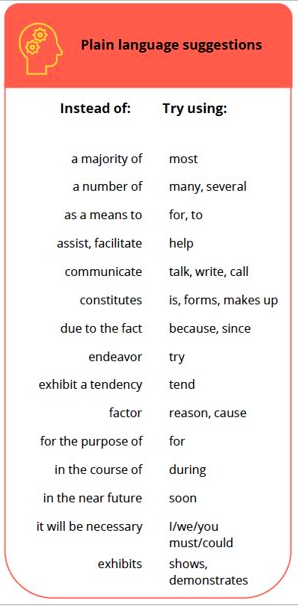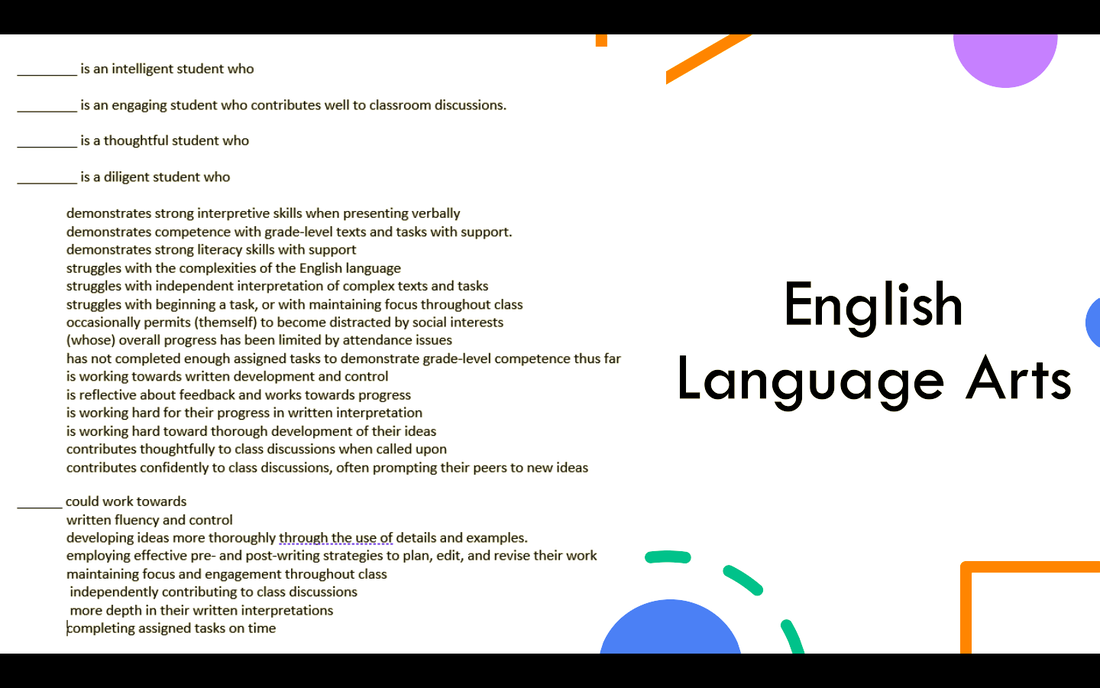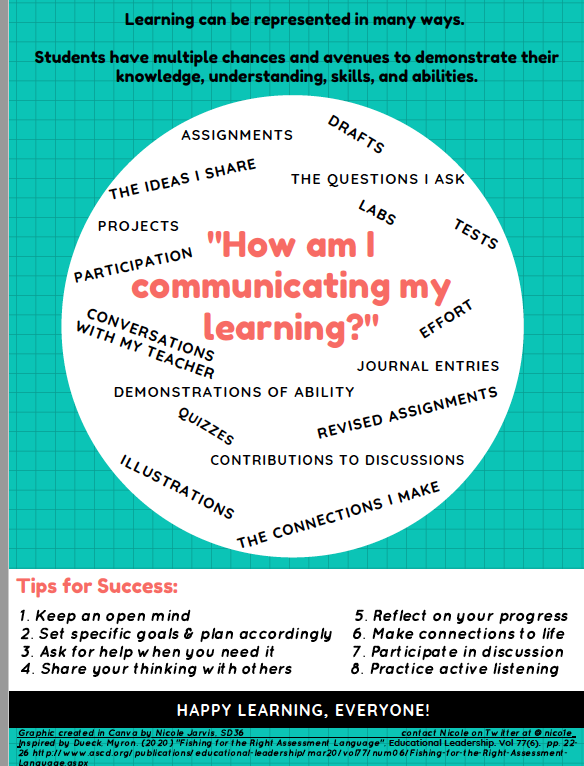Hi! Do YOU have samples and/or supporting resources to contribute? Please email us at bcecta [at] bctf [dot] ca!
The new B.C. Reporting Order (2022-2023)
| |||||||||||||
|
Summary of the new B.C. Reporting Order: (prepared by a teacher - January 2023)
|
| ||||||
Reporting Order Policy (PDF) A copy of the student reporting policy (75 pages) as of Dec '22.
K-12 Student Reporting Policy: Educator Summary Guide (PDF) much easier to read than the actual policy document!
Unpacking the Proficiency Scale. (PDF) A brief summary (2 pages) to help understand the language within the proficiency scale.
Criteria for Written Reports (PDF)
Summary for Families/Homes (PDF) 2 page summary brochure for families/homes highlighting changes in student reporting. K-12 Student Reporting Policy
K-12 Student Reporting Policy: Educator Summary Guide (PDF) much easier to read than the actual policy document!
Unpacking the Proficiency Scale. (PDF) A brief summary (2 pages) to help understand the language within the proficiency scale.
Criteria for Written Reports (PDF)
Summary for Families/Homes (PDF) 2 page summary brochure for families/homes highlighting changes in student reporting. K-12 Student Reporting Policy
Reporting, 8-12:
The core competencies are the foundation, bedrock, and over-arching goals of the learning curriculum. They are necessary enduring skills that students develop in order to engage in deep, lifelong learning, personal growth, and success. The core competencies are: Communication, Creative Thinking, Critical Thinking, Positive Personal & Cultural Identify, Personal Awareness and Responsibility, and Social Responsibility.
Teachers are developing proficiency scales and aligning descriptive feedback with those scales. The goal is to design assessment that is fair, transparent, and equitable to all learners.
Teachers create:
Technology can support quality Assessment and Reporting.
For example, many used Freshgrade for a number of years. Others have used Seesaw. Some use a private Instagram account in ways that share learning in non-identifying ways.
Some teachers are participating in a 2023-2024 pilot exploring the use of Microsoft 365's Spaces for the next school year with students and their families to communicate student learning in addition to MyEd BC reporting. Teachers engaging in the pilot will participate in a community of professional practice and receive comprehensive support in the use of Spaces. Support will include release days, hands-on training, frequent check-ins, and networking through TEAMS. Teachers will also provide feedback on the following: · quality documentation and formative assessment processes within Spaces
· the piloting and use of Spaces for the 2023-24 school year
· overall thoughts about Spaces, as well as sharing their students’, parents'/caregivers' experiences and feedback with the developer
Teachers are developing proficiency scales and aligning descriptive feedback with those scales. The goal is to design assessment that is fair, transparent, and equitable to all learners.
Teachers create:
- alignment between learning standards, success criteria and connected feedback to show student growth over time
- opportunities for students to self and peer assess
- opportunities for students to identify, curate and demonstrate evidence of learning (increased student ownership)
Technology can support quality Assessment and Reporting.
For example, many used Freshgrade for a number of years. Others have used Seesaw. Some use a private Instagram account in ways that share learning in non-identifying ways.
Some teachers are participating in a 2023-2024 pilot exploring the use of Microsoft 365's Spaces for the next school year with students and their families to communicate student learning in addition to MyEd BC reporting. Teachers engaging in the pilot will participate in a community of professional practice and receive comprehensive support in the use of Spaces. Support will include release days, hands-on training, frequent check-ins, and networking through TEAMS. Teachers will also provide feedback on the following: · quality documentation and formative assessment processes within Spaces
· the piloting and use of Spaces for the 2023-24 school year
· overall thoughts about Spaces, as well as sharing their students’, parents'/caregivers' experiences and feedback with the developer
All subject-areas are intended to develop students' NUMERACY skills (yes, even social studies!):
All subject-areas are intended to develop students' LITERACY skills (yes, even Shop Class!):
- Able to communicate understanding pictorally, concretely, symbolically, orally. Notice patterns, trends and deviations from trends and patterns in order to identify and inquire about irrularities. Use observations of patterns and deviations in order to infer around historical cause & consequence and/or continuity & change.
All subject-areas are intended to develop students' LITERACY skills (yes, even Shop Class!):
- Literacy (verbal / visual / kinesthetic) Able to communicate understanding pictorally, concretely, symbolically, orally. Notice patterns, trends and deviations from trends and patterns in order to identify and inquire about irrularities. Use observations of patterns and deviations in order to infer around historical cause & consequence and/or continuity & change.
- Literacy (Reading) Can use comprehension strategies before, during and after reading, viewing or listening in order to construct meaning. Apply a variety of thinking skills to gain meaning and deepen understanding of written, oral and visual texts. Respond to texts in personal, critical and creative ways to show thinking
- Literacy (Writing) developing our ability to write to communicate thoughts, feelings and opinions. Use writing processes to plan, develop, and create texts. Apply the structures and conventions of written language
Quality resources:
- Assessment Webinars & handouts "Building Student Success" - Tom Schimmer with the Ministry of Education curriculum.gov.bc.ca/classroom-assessment/webinars
- Shannon Shinkel 'Beyond Report Cards' Facebook Group & blog https://mygrowthmindset.home.blog/
- Communicating Student Learning - Surrey Schools - https://surreyschoolsone.ca/teachers/csl/
- Jennifer Lynn Moroz - The Assessment Syndicate - https://www.jenmo.org/ and on Youtube www.youtube.com/c/JenMoTeachAssess/videos
- The Surrey English Teachers' Association surreyenglishta.wordpress.com/resources/assessment/
- Math - assembled by SD36 Numeracy Helping Teachers https://sites.google.com/view/sd36clnumeracy/
--> assessment specific link https://sites.google.com/view/sd36clnumeracy/teaching/assessment
Examples of Core Competency Assessment
| en_8_and_9_scoring_guides__writing_and_reading_.doc | |
| File Size: | 62 kb |
| File Type: | doc |
|
Core Competency Reflection Template
Made with Google Jamboard <Click here to download the original version, or make a copy to edit and personalize on your own Google Account (please credit back to BCECTA or Nicole and give source credit following the footnote for the graphics.): Nicole uses this at the end of the year with students (they can talk about ANY class, club, extracurricular or home life) |
Reporting with Descriptive Feedback Aligned w/ the Proficiency Scales
|
Secondary reporting is moving towards:
Strengths: Focuses on what students can do now and what they are working on Next Steps: Explains areas for future growth, as well as strategies to support student growth Engagement: provides personalized feedback on student's learning habits and engagement. - including description of 3-4 curricular competency 'bins' for secondary subjects. For example, English already has 4 main categories for curricular competencies, but for subjects like English or Science maybe you will need to roll some competencies into over-arching assessment categories. - at least two personalized comments about each learner - ELL students need to have descriptors about their English language proficiency - anything about work habits will need to be embedded in the comments because the Work Habits column is gone for the last reporting period. (Work Habits = Midterm only) - "Insufficient evidence" instead of "Incomplete" 
|
SAMPLE COMMENT:
"This semester (STUDENT) found difficulty finding balance with school, life, extracurriculars, etc. In terms of their learning, (STUDENT) gained insight into pregnancy and childbirth options. This semester (STUDENT) gained new friendships through the group projects, and then learned with whom they worked well and did well in their project outcomes. (STUDENT) found Design thinking useful for projects and will use these skills in other classes, especially project-based. This semester (STUDENT)'s proudest service design project was about normalizing post-partum bodies. (STUDENT) went out of their comfort zone and asked potential users for real feedback." - submitted by Lynnette Earle Teacher | Languages Department Head | Assessment Lead | Insta @ms.lynnette.earle Twitter: @ms_lynnette_edu Chilliwack Secondary School | ||||||||||||||||||||
Sample End-of-Semester Report Card comment for French Immersion Social Studies 9:
Sample from Nicole Jarvis, Surrey teacher & president of the B.C. Early Career Teachers' Association.
In Social Studies 9 this year we engaged in skill-development activities that continue the journey we began in grade eight. The over-arching 'story' of the course focused on Human Rights, Revolution, and Continuity and Change. Our course competency goals are divided into four sections or categories:
1) THINKING CRITICALLY, using Historical Thinking Concepts such as primary source analysis, perspective-taking, locating biases or judgements in texts, judging sources for credibility, assessing decisions made in their time, analyzing continuity and change, locating turning points, and discussing causes and consequences.
2) INVESTIGATING AND RESEARCHING using various research skills and inquiry processes such as asking questions, gathering information, and engaging with evidence and interpretation.
3) COMMUNICATING findings, conclusions, and decisions, using verbal, visual and written methods of communication.
4) ENACTING social responsibility, personal responsibility and creativity.
STUDENT is an enthusiastic, driven, engaged, kind and responsible learner who has an excellent bias-to-action. They initiate and complete tasks without needing any prompting to make effective use of class time. I encourage STUDENT to communicate verbally with the teacher to share questions, ideas, and propose alternatives to suit their learning needs so that they are practicing their verbal skills and also allowing the teacher to gain insight into their learning beyond written tasks.
STUDENT is able to locate degrees of progress, decline and turning points in history and assess progress and decline through the lens of empathy with a specific historical perspective. STUDENT is also able to use specific and insightful evidence from observations in primary and secondary sources in order to support claims. It was a lot of fun to observe STUDENT think strategically and work independently with confidence. I encourage STUDENT to embrace, reativity and feel confident about adding personal opinions, questions, insights and connections to class assignments in social studies. STUDENT needs to spend 20 minutes per day outside of school (including during vacations and school breaks) doing extra French listening, reading out-loud and viewing French programs to continue building vocabulary and fluency in the target language. I look forward to getting to know them even better next year.
Sample from Nicole Jarvis, Surrey teacher & president of the B.C. Early Career Teachers' Association.
In Social Studies 9 this year we engaged in skill-development activities that continue the journey we began in grade eight. The over-arching 'story' of the course focused on Human Rights, Revolution, and Continuity and Change. Our course competency goals are divided into four sections or categories:
1) THINKING CRITICALLY, using Historical Thinking Concepts such as primary source analysis, perspective-taking, locating biases or judgements in texts, judging sources for credibility, assessing decisions made in their time, analyzing continuity and change, locating turning points, and discussing causes and consequences.
2) INVESTIGATING AND RESEARCHING using various research skills and inquiry processes such as asking questions, gathering information, and engaging with evidence and interpretation.
3) COMMUNICATING findings, conclusions, and decisions, using verbal, visual and written methods of communication.
4) ENACTING social responsibility, personal responsibility and creativity.
STUDENT is an enthusiastic, driven, engaged, kind and responsible learner who has an excellent bias-to-action. They initiate and complete tasks without needing any prompting to make effective use of class time. I encourage STUDENT to communicate verbally with the teacher to share questions, ideas, and propose alternatives to suit their learning needs so that they are practicing their verbal skills and also allowing the teacher to gain insight into their learning beyond written tasks.
STUDENT is able to locate degrees of progress, decline and turning points in history and assess progress and decline through the lens of empathy with a specific historical perspective. STUDENT is also able to use specific and insightful evidence from observations in primary and secondary sources in order to support claims. It was a lot of fun to observe STUDENT think strategically and work independently with confidence. I encourage STUDENT to embrace, reativity and feel confident about adding personal opinions, questions, insights and connections to class assignments in social studies. STUDENT needs to spend 20 minutes per day outside of school (including during vacations and school breaks) doing extra French listening, reading out-loud and viewing French programs to continue building vocabulary and fluency in the target language. I look forward to getting to know them even better next year.
Sample End-of-Semester Report Card comment for Social Studies 10:
Sample from Nicole Jarvis, Surrey teacher & president of the B.C. Early Career Teachers' Association.
(STUDENT) can creatively / can / is almost able to / is beginning to infer how values fuel actions and decisions, and how actions, decisions and events can suggest underlying values, biases, and priorities.
(STUDENT) can creatively / can / is almost able to / is beginning to identify significant factors and events in historical time periods, such as the Cold War (Cuban Missile Crisis, Vietnam War, Iran).
(STUDENT) can creatively / can / is almost able to / is beginning to show understanding of immediate and underlying causes, as well as intended and unintended consequences of (EVENT/PHENOMENON).
(STUDENT) can creatively / can / is almost able to / is beginning to describe how Canadian identity has been shaped by major international and domestic events.
(STUDENT) can creatively / can / is almost able to / is beginning to compare how ethical judgements in the past may have differed among perspective groups and also differ from our ethical judgements of actions and circumstances in the present-day.
(STUDENT) can creatively / can / is almost able to / is beginning to describe / justify / evaluate how _______ shapes policy and identity in different regions of Canada.
(STUDENT)can creatively / can / is almost able to / is beginning to build on other people's ideas and extend to contribute own ideas during conversations, group activities, and class discussions.
(STUDENT) can creatively / can / is almost able to / is beginning to take different perspectives on issues and use evidence to support their decisions and their thinking.
(STUDENT) can creatively / can / is almost able to / is beginning to use "Claim-Evidence-Reasoning" format to explain our thinking.
(STUDENT) can creatively / can / is almost able to / is beginning to use visual thinking strategies such as "I see, I think, I wonder..." to closely observe, consider, discuss, and query primary sources.
(STUDENT) can creatively / can / is almost able to / is beginning to glean significant information from audio texts (Podcasts), visual texts (pictures, paintings, videos), and written texts (Primary source documents, Secondary Source texts).
(STUDENT) can creatively / can / is almost able to / is beginning to build increasingly specific historical thinking inquiry questions.
SUGGESTIONS: Watch the news (BBC, CBC, Al-Jazeera) listen to podcasts about historical or current events (History Unplugged, Secret Life of Canada), watch historical feature or documentary films (The Zookeeper's Wife, 1917, War Horse), and read the newspaper or graphic novels about historic events (Chester Brown's Louis Riel, MAUS, Escape from Syria, Persepolis).
Sample from Nicole Jarvis, Surrey teacher & president of the B.C. Early Career Teachers' Association.
(STUDENT) can creatively / can / is almost able to / is beginning to infer how values fuel actions and decisions, and how actions, decisions and events can suggest underlying values, biases, and priorities.
(STUDENT) can creatively / can / is almost able to / is beginning to identify significant factors and events in historical time periods, such as the Cold War (Cuban Missile Crisis, Vietnam War, Iran).
(STUDENT) can creatively / can / is almost able to / is beginning to show understanding of immediate and underlying causes, as well as intended and unintended consequences of (EVENT/PHENOMENON).
(STUDENT) can creatively / can / is almost able to / is beginning to describe how Canadian identity has been shaped by major international and domestic events.
(STUDENT) can creatively / can / is almost able to / is beginning to compare how ethical judgements in the past may have differed among perspective groups and also differ from our ethical judgements of actions and circumstances in the present-day.
(STUDENT) can creatively / can / is almost able to / is beginning to describe / justify / evaluate how _______ shapes policy and identity in different regions of Canada.
(STUDENT)can creatively / can / is almost able to / is beginning to build on other people's ideas and extend to contribute own ideas during conversations, group activities, and class discussions.
(STUDENT) can creatively / can / is almost able to / is beginning to take different perspectives on issues and use evidence to support their decisions and their thinking.
(STUDENT) can creatively / can / is almost able to / is beginning to use "Claim-Evidence-Reasoning" format to explain our thinking.
(STUDENT) can creatively / can / is almost able to / is beginning to use visual thinking strategies such as "I see, I think, I wonder..." to closely observe, consider, discuss, and query primary sources.
(STUDENT) can creatively / can / is almost able to / is beginning to glean significant information from audio texts (Podcasts), visual texts (pictures, paintings, videos), and written texts (Primary source documents, Secondary Source texts).
(STUDENT) can creatively / can / is almost able to / is beginning to build increasingly specific historical thinking inquiry questions.
SUGGESTIONS: Watch the news (BBC, CBC, Al-Jazeera) listen to podcasts about historical or current events (History Unplugged, Secret Life of Canada), watch historical feature or documentary films (The Zookeeper's Wife, 1917, War Horse), and read the newspaper or graphic novels about historic events (Chester Brown's Louis Riel, MAUS, Escape from Syria, Persepolis).
For example, I write one good comment that I can use for a whole bunch of students, and then all I have to change is the student's name, which I can do easily and quickly using select + CTRL+F+Replace.
All I do is write a 'developing' comment, a 'proficient' comment, and an 'extending' comment. Then I copy/paste them, change the kids' name, and done! Using they/them pronouns makes it super easy because you don't have to change the pronouns around.
(Student) is a cooperative learner who engaged to their fullest abilities in Socials 10 this quarter, so they deserve to feel proud of themselves! We practiced how to infer how values fuel actions and decisions, and how actions, decisions and events can suggest underlying values, biases, and priorities. (Student) can identify significant factors and events in historical time periods such as WWI and the 1960's that shaped policy and identity in different regions of Canada. (Student) can describe how Canadian identity has been shaped by some major international and domestic events, such as the Cold War (Cuban Missile Crisis, Vietnam War, Iran). (Student) can show her understanding of immediate and underlying causes, as well as intended and unintended consequences of events such as World War Two and the Ukrainian Internments in Canada. (Student) is able to compare how ethical judgements in the past may have differed among perspective groups and also differ from our ethical judgements of actions and circumstances in the present-day. They were able to build on other people's ideas and extend to contribute own ideas during conversations, group activities, and class discussions. (Student) can also take different perspectives on issues and use evidence to support decisions and thinking by using "Claim-Evidence-Reasoning" format to explain. (Student) put their hand up quite a few times to contribute to class discussions when we used visual thinking strategies such as "I see, I think, I wonder..." to closely observe, consider, discuss, and query primary sources. (Student) was able to glean significant information from audio texts (Podcasts), visual texts (pictures, paintings, videos), and written texts (Primary source documents, Secondary Source texts). (Student) is able to build increasingly specific historical thinking inquiry questions. - way to go! I am so glad that I got to be your teacher.
Suggestions for further learning: Watch the news (BBC, CBC, Al-Jazeera) listen to podcasts about historical or current events (History Unplugged, Secret Life of Canada), watch historical feature or documentary films (The Zookeeper's Wife, 1917, War Horse), and read the newspaper or graphic novels about historic events (Chester Brown's Louis Riel, MAUS, Escape from Syria, Persepolis).
All I do is write a 'developing' comment, a 'proficient' comment, and an 'extending' comment. Then I copy/paste them, change the kids' name, and done! Using they/them pronouns makes it super easy because you don't have to change the pronouns around.
(Student) is a cooperative learner who engaged to their fullest abilities in Socials 10 this quarter, so they deserve to feel proud of themselves! We practiced how to infer how values fuel actions and decisions, and how actions, decisions and events can suggest underlying values, biases, and priorities. (Student) can identify significant factors and events in historical time periods such as WWI and the 1960's that shaped policy and identity in different regions of Canada. (Student) can describe how Canadian identity has been shaped by some major international and domestic events, such as the Cold War (Cuban Missile Crisis, Vietnam War, Iran). (Student) can show her understanding of immediate and underlying causes, as well as intended and unintended consequences of events such as World War Two and the Ukrainian Internments in Canada. (Student) is able to compare how ethical judgements in the past may have differed among perspective groups and also differ from our ethical judgements of actions and circumstances in the present-day. They were able to build on other people's ideas and extend to contribute own ideas during conversations, group activities, and class discussions. (Student) can also take different perspectives on issues and use evidence to support decisions and thinking by using "Claim-Evidence-Reasoning" format to explain. (Student) put their hand up quite a few times to contribute to class discussions when we used visual thinking strategies such as "I see, I think, I wonder..." to closely observe, consider, discuss, and query primary sources. (Student) was able to glean significant information from audio texts (Podcasts), visual texts (pictures, paintings, videos), and written texts (Primary source documents, Secondary Source texts). (Student) is able to build increasingly specific historical thinking inquiry questions. - way to go! I am so glad that I got to be your teacher.
Suggestions for further learning: Watch the news (BBC, CBC, Al-Jazeera) listen to podcasts about historical or current events (History Unplugged, Secret Life of Canada), watch historical feature or documentary films (The Zookeeper's Wife, 1917, War Horse), and read the newspaper or graphic novels about historic events (Chester Brown's Louis Riel, MAUS, Escape from Syria, Persepolis).
Hi! Do YOU have samples and/or supporting resources to contribute? Please email us at bcecta [at] bctf [dot] ca!
Let the kids pick their comments! Give them a checklist like this one below:
English Language Arts sample provided by E. Preston, Surrey Teacher & School-based mentoring lead
Posters, anchor charts, reference tools for conferencing with families and/or learners:
Hi! Do YOU have samples to contribute? Please email us at bcecta [at] bctf [dot] ca!
| |||||||
1. "Can you decolonize assessment?" by Carolyn Roberts, Faculty Lecturer and PhD student at SFU. Passionate about Indigenous education and changing the conversations. Proud, strong Coast Salish Warrior. Blog post published Feb 12 2023.
Video: "Reconciliation in your Community" | Carolyn Roberts | TEDxLangleyED
2. "The Love Language of Professional Judgment." Shannon Schinkel. My Growth Mindset Blog. Shannon is a co-founding member of the Assessment Consortium of BC (ACBC). Blog Post published Feb 12, 2023
3. Video Series: "Culturally Responsive Math Assessment" from @UBCEduc / @EdithLandoVLC
Video: "Reconciliation in your Community" | Carolyn Roberts | TEDxLangleyED
2. "The Love Language of Professional Judgment." Shannon Schinkel. My Growth Mindset Blog. Shannon is a co-founding member of the Assessment Consortium of BC (ACBC). Blog Post published Feb 12, 2023
3. Video Series: "Culturally Responsive Math Assessment" from @UBCEduc / @EdithLandoVLC
Grades Conferencing - Sample Frameworks from BC Teachers
Learning Maps, Course Rubrics |
|
Primary:
Lower Intermediate
Upper Intermediate
Middle / Junior Secondary
Lower Intermediate
Upper Intermediate
Middle / Junior Secondary
- Social Studies Click here for Example Learning Map 1
- SD33 ADST @ms_lynnette_edu on Twitter: "My most recent were all student generated through learning interviews I did with my students. I paraphrased their words about their learning. "
- SD68 @KellyBarnum68 "I take mine directly from the wording of the curricular competencies."
- Prince George: "I do assessment interviews with my students & take notes as we speak. The notes go home as an attachment to their report card." (Example of a filled-out Notes page pending)
- Social Studies Click here for Example Learning Map 1
Sample Student reflection in report cards and interim reports
Hi! Do YOU have samples to contribute? Please email us at bcecta [at] bctf [dot] ca!
|
| ||||||||||||
